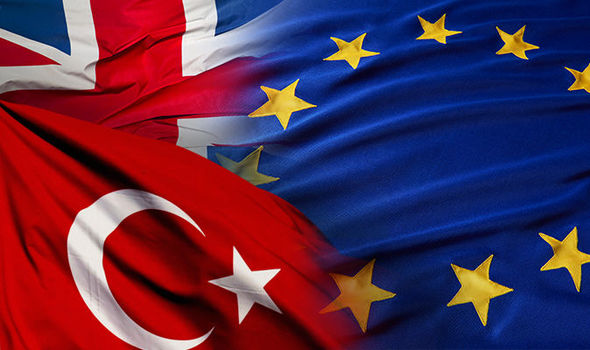
The formal signing Dec. 29 of a trade deal between Turkey and the UK was welcomed by representatives of Turkish industry and the UK steel and automotive sectors as ensuring the continuation of business between the two nations without additional tariffs from its introduction on Jan 1, 2021.
The deal is viewed as a stopgap to prevent negative consequences in the current GBP 18.6 billion ($25.1billion) annual trading relationship between the two nations from the UK’s exit from the EU. “Both countries have also committed to working towards a more ambitious free trade agreement in the future, which will go further than the existing deal and will be tailored to the UK economy,” the UK Department for International Trade (DIT) stated.
The deal secures existing preferential trade terms and tariffs for UK businesses that exported more than GBP 1 billion worth of machinery, and iron and steel exports worth GBP 575 million, to Turkey in 2019, ensuring the continued tariff-free flow of goods and protecting UK-Turkey supply chains in the automotive, manufacturing and steel sectors, according to the DIT.
The UK’s imports of textiles and white goods from Turkey are also covered by the accord.
Turkey and the EU have operated a customs union since 1995. This week’s end of the UK’s transition period for leaving the EU would have subjected about 75% of Turkish exports to UK to tariffs, causing losses of some $2.4 billion, had the new deal not been signed, Turkish trade minister Ruhsar Pekcan told official news agency AA following the signing in a ceremony with UK international trade secretary Liz Truss who was present on a videocall.
The UK automotive and steel sectors were highlighted as two areas most likely to benefit from uninterrupted trade flows between the nations. “The finalization of today’s trade deal with Turkey is welcome news for industry and manufacturing in particular,” said Stephen Phipson, CEO of Make UK, a manufacturers’ association whose members include steelmakers and automakers. “Securing preferential tariffs for UK businesses exporting to Turkey and ensuring the continued tariff free flow of goods is vital to protect UK-Turkey supply chains, supply chains which are critical to our automotive industry in particular.”
“It is also extremely helpful that both sides have also committed to work towards a more ambitious free trade agreement in the coming months which will deliver a welcome boost to the UK economy as it comes out of the current COVID crisis,” Phipson said in a statement.
Turkish steel sources said they hoped the accord would help correct an existing steel trade imbalance between the two nations. The UK is one of Turkey’s largest steel scrap suppliers and has recently seen its scrap exports to Turkey grow, while Turkey’s steel exports to the UK have dwindled.
Vehicle assembly in Turkey
Stuart Rowley, president, Ford of Europe, noted that car parts are exported from the UK to Turkey to assemble the Ford Transit range of vehicles, a third of which are then exported back to the UK. In 2019, UK car exports to Turkey were worth GBP 174 million.
“Given that Ford and Ford Otosan business constitutes more than 10% of the total trade volume between the UK and Turkey, this trade agreement is extremely significant for us and will help to secure jobs in both countries,” Rowley said in a statement.
Turkey eyes bilateral investments
Turkish minister Pekcan said the arrangement leaves no uncertainty in the trade structure between the two countries. “We are taking the first step towards further deepening our ties, while maintaining 25-year gains from the Customs Union,” she said.
“We reached a tariff-free agreement, as planned, which includes all industrial and agricultural goods,” the minister said.
Trade volume between the two countries was $15.1 billion in January-November, Pekcan said. In 2019, Turkey’s exports to the UK – its second-largest export market – stood at $11.3 billion, while imports totaled $5.6 billion. UK investments in Turkey amount to around $11.6 billion.
“I hope the deal will be reflected positively in bilateral investments,” Pekcan underlined.
— Diana Kinch and Cenk Can





